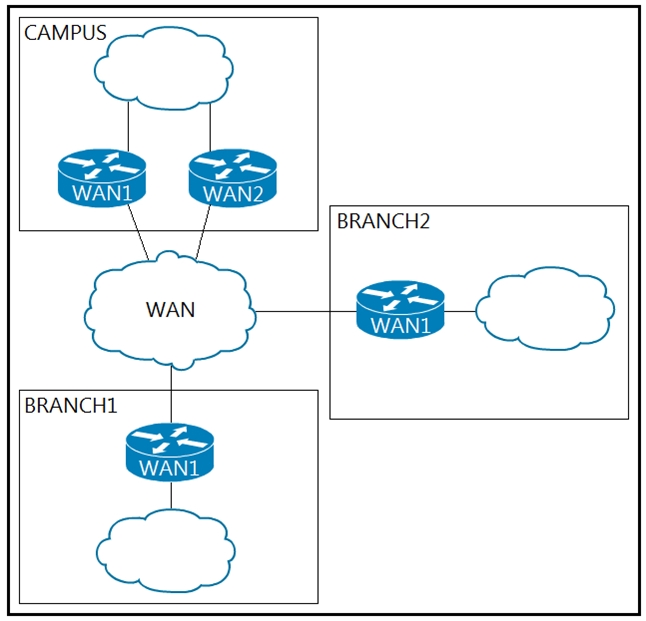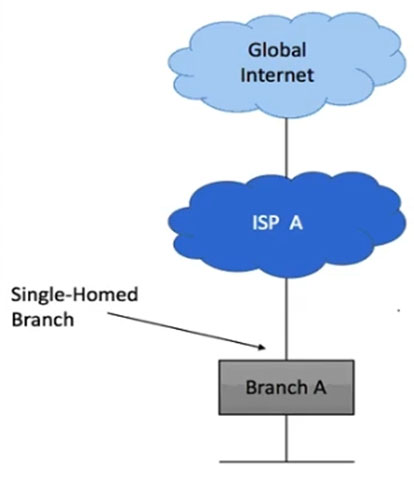Question 21
Refer to the exhibit. An architect must design an IP addressing scheme for a multisite network connected via a WAN transit. The campus site must accommodate12,000 devices, and the branch sites must accommodate 1,000 devices. Which address scheme optimizes network device resources, contains convergence events to the different blocks of the network, and ensures the network's future growth?

A. Campus: 10.0.0.0/18 Branch1: 10.0.192.0/21 Branch2: 10.0.200.0/21
B. Campus: 10.0.0.0/16 Branch1: 10.255.0.0/20 Branch2: 10.255.16.0/20
C. Campus: 10.0.0.0/10 Branch1: 10.64.0.0/10 Branch2: 10.128.0.0/10
D. Campus: 10.0.0.0/20 Branch1: 10.0.64.0/21 Branch2: 10.0.128.0/21
Question 22
Refer to the exhibit. Area 10 is a regular OSPF area, and networks 10.1.1.0/24 and 172.16.1.0/24 are internal. Which design provides optimal routing between both networks when the link between routers C and E fails?

A. Move the link between routers C and D to area 10.
B. Create an OSPF virtual link between routers E and F.
C. Create a tunnel between routers E and F in area 10.
D. Make area 10 a not-so-stubby area.
Question 23
Refer to the exhibit. An engineer is designing an OSPF network for a client. Requirements dictate that the routers in Area 1 should receive all routes belonging to the network, including EIGRP, except the ones that originated in the RIP domain. Which action should the engineer take?

A. Make area 1 a NSSA. Most Voted
B. Make area 1 a stub.
C. Make area 1 a standard OSPF area.
D. Make the area 1 routers part of area 0.
Question 24
An engineer is tasked with designing a dual BGP peering solution with a service provider. The design must meet these conditions: *The routers will not learn any prefix with a subnet mask greater than /24. *The routers will determine the routes to include in the routing table based on the length of the mask alone. *The routers will make this selection regardless of the service provider configuration.Which solution should the engineer include in the design?
A. Use a route map and access list to block the desired networks, and apply the route map to BGP neighbors inbound.
B. Use a route map and prefix list to block the desired networks, and apply the route map to BGP neighbors outbound.
C. Use an IP prefix list to block the desired networks and apply the IP prefix list to BGP neighbors outbound.
D. Use an IP prefix list to block the desired networks and apply the IP prefix list to BGP neighbors inbound.
Question 25
An engineer is designing an EIGRP network for a small branch office site where there is only one Layer 3 router. The engineer wants the router to advertise the local LAN network to remote EIGRP neighbors without sending any unnecessary multicast messages on the local LAN. Which action should the engineer take?
A. Use a static default route for this site instead of EIGRP
B. Advertise the local LAN using the network command and the passive-interface feature
C. Redistribute the local LAN network using the redistribute connected command
D. Advertise the local LAN subnet as a stub network
Question 26
Refer to the exhibit. An architect must design a solution to connect the network behind R3 with the EIGRP network. Which mechanism should be included to avoid routing loops?

A. down bit
B. split-horizon
C. route tags
D. summarization
Question 27
An architect is creating a migration strategy for a large organization in which the choice made by the application between IPv6 and IPv4 is based on the DNS request. Which migration strategy does the architect choose?
A. AFT for public web presence
B. host-initiated tunnels
C. dual-stack
D. site-to-site IPv6 over IPv4 tunnels
Question 28
An engineer is creating a design to enable IPv6 to run on an existing IPv4 IS-IS network. The IPv4 and IPv6 topologies will match exactly, and the engineer plans to use the same IS-IS router levels for each protocol per interface. Which IS-IS design is required?
A. multi topology without enabling transition feature
B. multi topology with transition feature enabled
C. single topology without enabling transition feature Most Voted
D. single topology with transition feature enabled
Question 29
An engineer must connect a new remote site to an existing OSPF network. The new site consists of two low-end routers, one for WAN, and one for LAN. There is no demand for traffic to pass through this area. Which area type does the engineer choose to provide minimal router resource utilization, while still allowing for full connectivity to the rest of the network?
A. not so stubby
B. totally not so stubby
C. totally stubby area
D. stubby area
Question 30
Refer to the exhibit. An architect is designing a BGP solution to connect a remote branch to a service provider. There are several prefixes within the branch that the company does not want to be advertised to the Internet. Which solution should the architect use to accomplish this?

A. Attach the No-Export community with the prefixes to exclude.
B. Use the BGP No-Advertise community for the prefixes to exclude.
C. Set the BGP Internet community for all prefixes.
D. Implement the NOPEER community.




